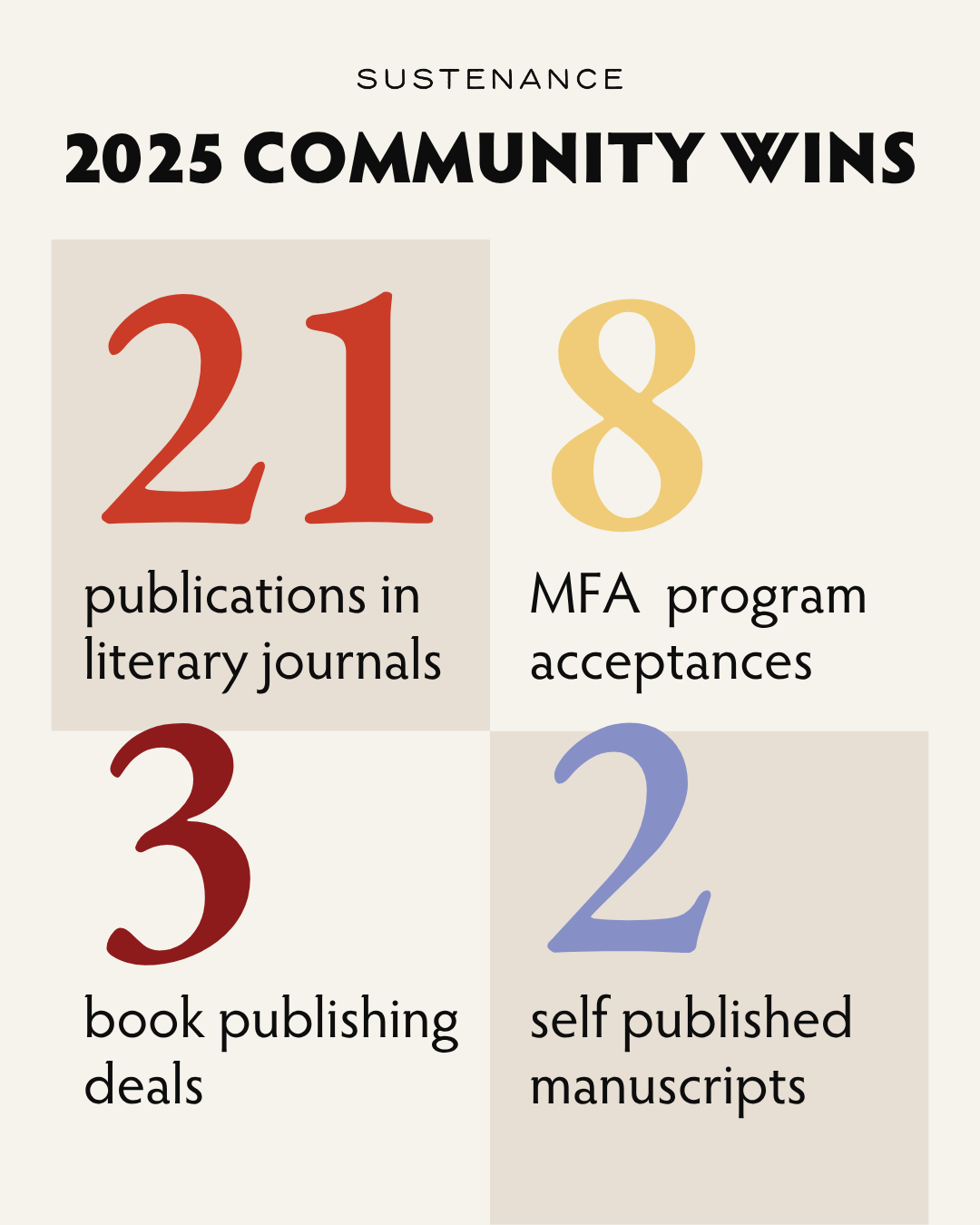Five ways to make your writing instantly better
(And a reminder that Sustenance opens in 48 hours)
Quick reminder: My craft-driven writing community, Sustenance, opens in 48 hours to 40 new members. You must be on the waitlist to receive the sign up link. At 200 members, Sustenance hosts feedback sessions with MFA-level mentors, renowned guest speakers like Ellen Bass, Chen Chen, Marie Howe, and Pam Houston, along with monthly challenges, generative sessions, small groups, and ongoing community support.
We have over 1300 people on the waitlist so act fast when the link goes out at 1pm PST. First come, first serve. After the spots fill (and they sold out last time within minutes), the community is closed and won’t open to new members until 2026. This is also the last chance to join at the current tuition rate.
Today, I’m sharing my top 5 weird but effective ways to make your writing instantly better:
Write from the belly
Often when we go to write, we forget we’re mostly skin. There’s a chunk of heart and a little brain in there also, but mostly we’re skin. That’s where we first experience language. It’s why the word whoosh makes us shiver. Because we read and feel it at the same time. For a moment, there’s wind whipping in our hair, waves in our throat. You can’t always know rationally what will make a good poem, but you can trust your body to show you what sticks.
Write what you (wish you didn’t) know.
We've all heard the advice: write what you know but I dare you to write what you wish you DIDN'T know. Your weird insecurities, your loneliness, the fact your dog isn't fully housebroken or your toddler always cries or you're a poet with writer's block. Catalog all the ways you're human. Stop trying to be a hero. Those are the stories worth reading. That's what feels remotely like hope.
Trouble the waters
The greatest catalyst for a writer’s growth is to become unsatisfied with niceties. To get bored with safe poems and their expected endings. Ask yourself—where can I complicate my piece? How can I subvert expectations? If your poem ends with birds taking flight or light coming in, look for an opportunity to deepen, subvert, or add nuance. Resist easy answers and neatly tied bows. Tension is what gives our work energy and muscle. Refuse to let your poems be placid. Don’t be afraid to make waves.
Be a poet, not a preacher
Especially on social media, poets seem hellbent on teaching us something. Some grand lesson or eternal moral. I know this comes from wanting to add value, but my best advice is to skip the sermon and instead haunt the unsayable. Want readers? Articulate the strange/confusing/exhausting nature of being human. A poet’s true job is not to offer advice, but, rather, to aptly name the ache.
Gnarl the oak
Our brain naturally thinks in cliches (see gnarled oaks or babbling brooks). It’s how we expedite and communicate efficiently. In poetry, we resist cliches not because they are evil but because they don’t create excitement in the body or brain. Most of the time, we simply need to push our first idea further. Squeeze, gnarl, or spin the cliche until you find freshness. Twist tired language until it becomes new and experiential.
For example, you might say death was dark. That’s a perfectly fine start. Now all you have to do is get specific— a dark what? Perhaps death was a dark bird. Better. Now let’s invert and add context: Death’s dark birds hunted us like prey. Bingo. Now you have something terrifying. Now you have something true.
If you’re looking to join a supportive writing community in 2025, find accountability, and reach ambitious goals, we have 40 spots open in Sustenance.
P.S. Check out some of our biggest wins in Sustenance so far!
Let me know what questions you have about the community in the comments and I’ll answer them!





Such great tips - thank you, Joy!
#4 🙌🙌🙌